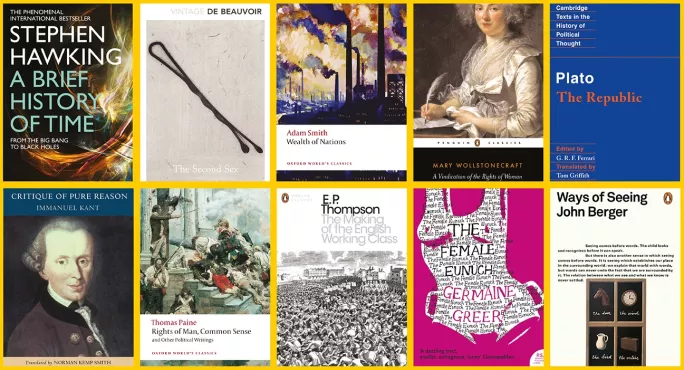Have you read the 20 books that changed the world?

Up with the people! Down with the patriarchy! And colonialism! Consign them all to Room 101. Or perhaps simply suffer the slings and arrows of outrageous fortune, and hope that the fittest survive.
Nothing in the previous paragraph would make any sense were it not for several culture-defining academic books.
To highlight the difference that thought-provoking books can make, the Booksellers Association has published a list of the top 20 academic books that have changed the world. The public can now vote for their favourite, and the winner will be revealed during Academic Book Week in November.
The shortlist - voted for by academic booksellers, librarians and publishers - includes contributions to political theory and thought, such as The Communist Manifesto by Karl Marx and Friedrich Engels, The Rights of Man by Thomas Paine and Orientalism by Edward Said.
A number of feminist classics appear, from Mary Wollstonecraft’s 1792 volume A Vindication of the Rights of Woman, through to Germaine Greer’s 1970 book The Female Eunuch.
The list also includes classics of science, philosophy, economics and environmentalism. The most recent is Stephen Hawking’s 1988 popularisation of astrophysics, A Brief History of Time.
The only works of fiction that appear are George Orwell’s novel, Nineteen Eighty-Four - which came top of the TES list of 100 books students should read before leaving secondary school - and the complete works of Shakespeare. These were both described as “surprising inclusions” by the Bookseller’s Association, presumably because they do not strictly qualify as academic books.
Alan Staton, of the Booksellers Association, believes that the books on the list are as essential for secondary-school students as they are for those in academia.
“They’re books of ideas, aren’t they?” he said. “And, obviously, many are books that will be studied, anyway.”
He also expects that most teachers will either have read the books, or will be aware of the arguments they present. “These ideas have permeated culture as a whole,” he said. “The thoughts expressed in them have become quite mainstream. In order to move thought forwards, we need to know what’s come before.”
The top 20 academic books that changed the world
- A Brief History of Time by Stephen Hawking
- A Vindication of the Rights of Woman by Mary Wollstonecraft
- Critique of Pure Reason by Immanuel Kant
- Nineteen Eighty-Four by George Orwell
- On the Origins of Species by Charles Darwin
- Orientalism by Edward Said
- Silent Spring by Rachel Carson
- The Communist Manifesto by Marx & Engels
- Complete Works, William Shakespeare
- The Female Eunuch by Germaine Greer
- The Making of the English Working Class by EP Thompson
- The Meaning of Relativity by Albert Einstein
- The Naked Ape by Desmond Morris
- The Prince by Niccolò Machiavelli
- The Republic by Plato
- The Rights of Man by Thomas Paine
- The Second Sex by Simone de Beauvoir
- The Uses of Literacy by Richard Hoggart
- The Wealth of Nations by Adam Smith
- Ways of Seeing by John Berger
Want to keep up with the latest education news and opinion? Follow TES on Twitter and like TES on Facebook
Keep reading for just £1 per month
You've reached your limit of free articles this month. Subscribe for £1 per month for three months and get:
- Unlimited access to all Tes magazine content
- Exclusive subscriber-only stories
- Award-winning email newsletters



